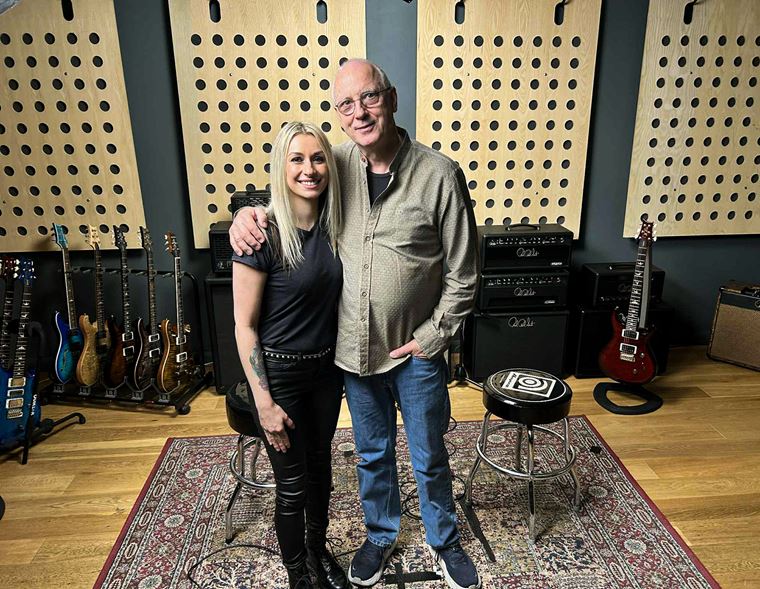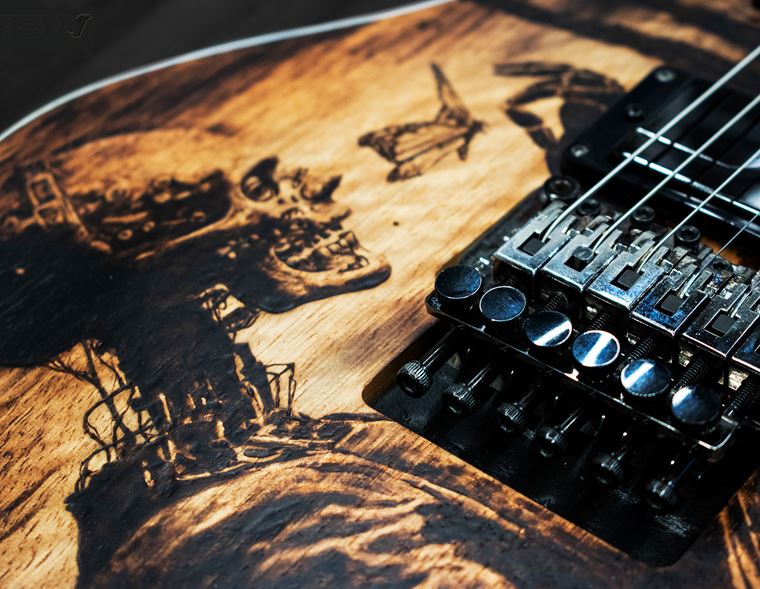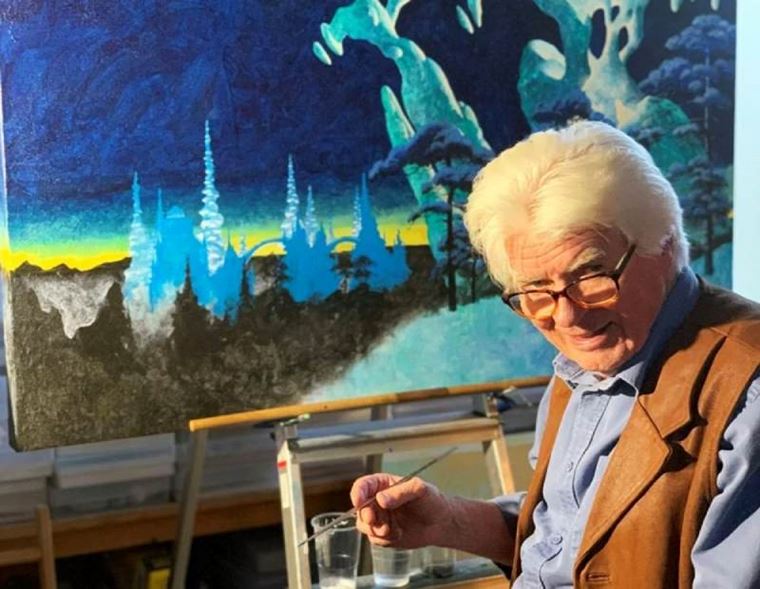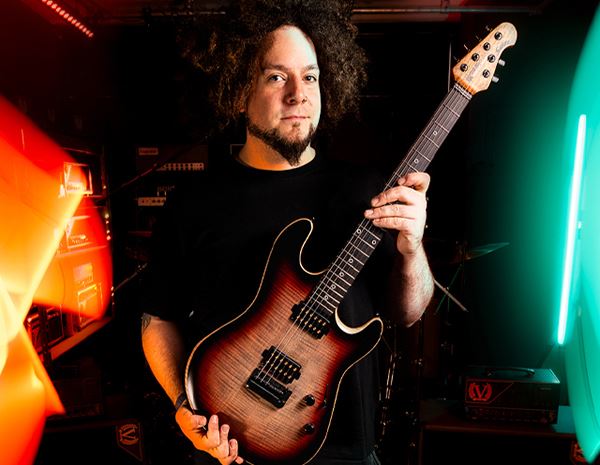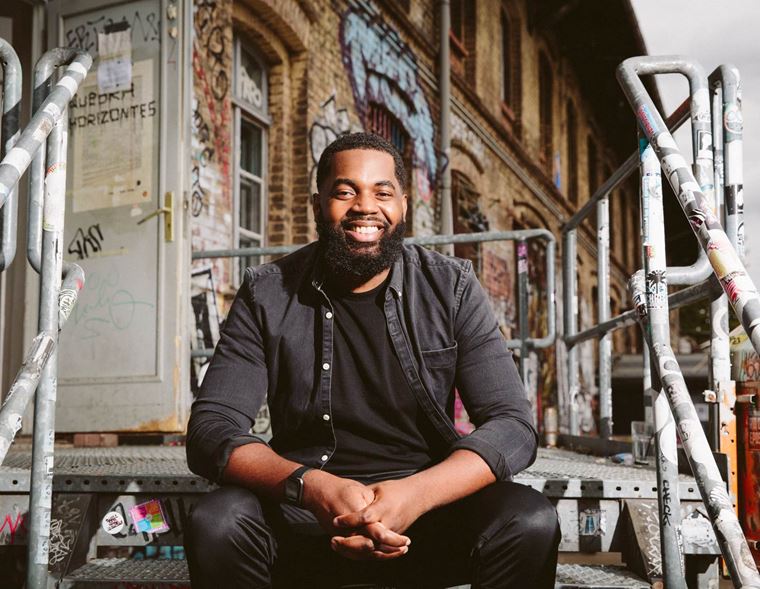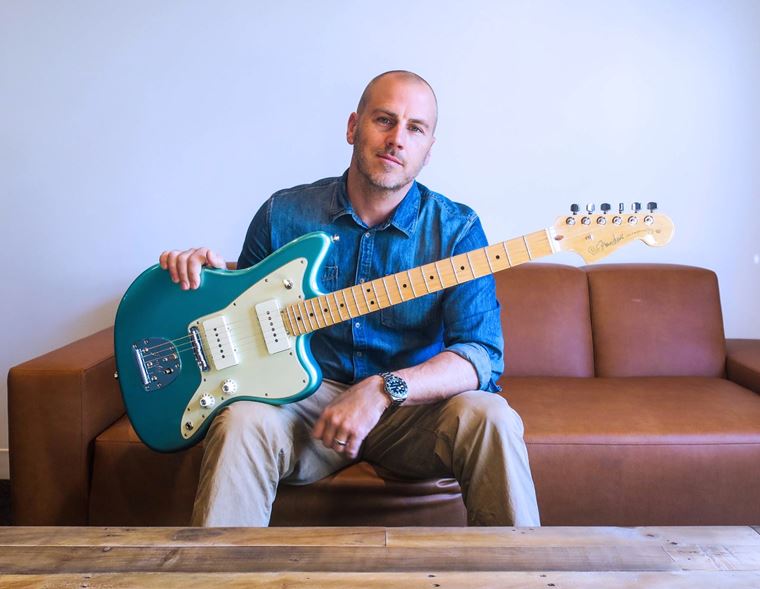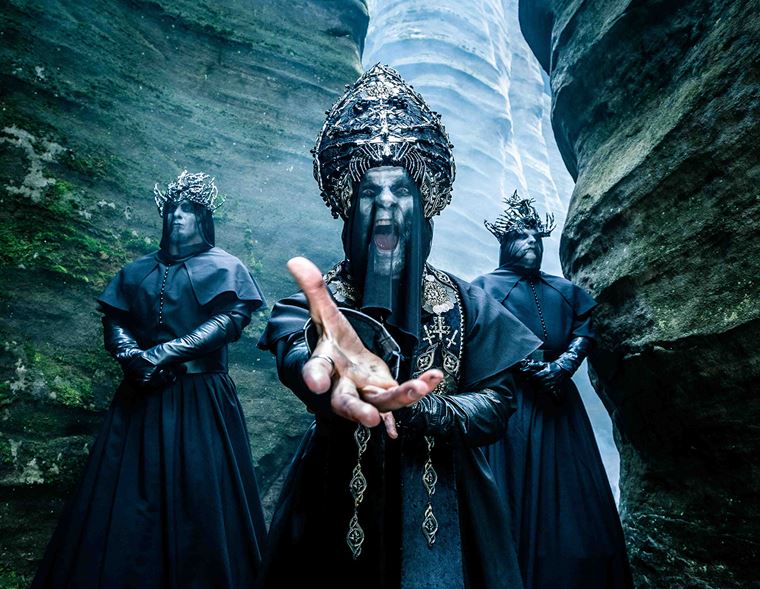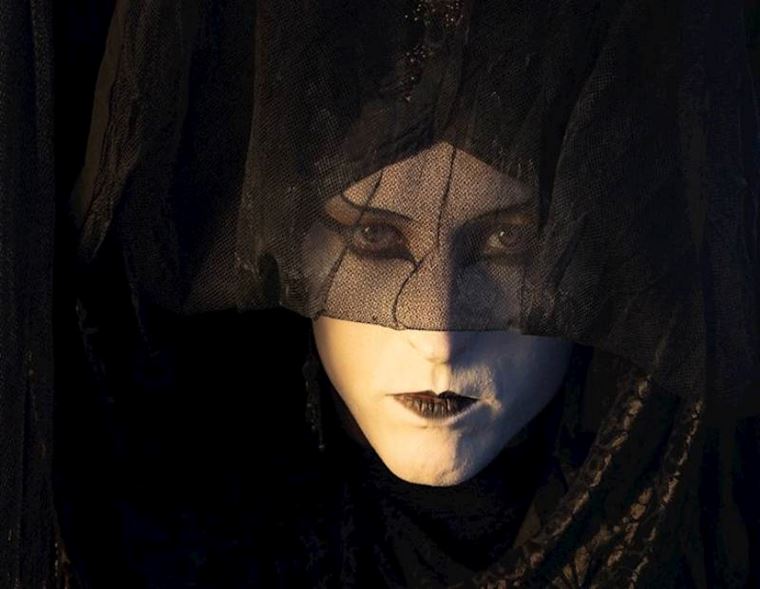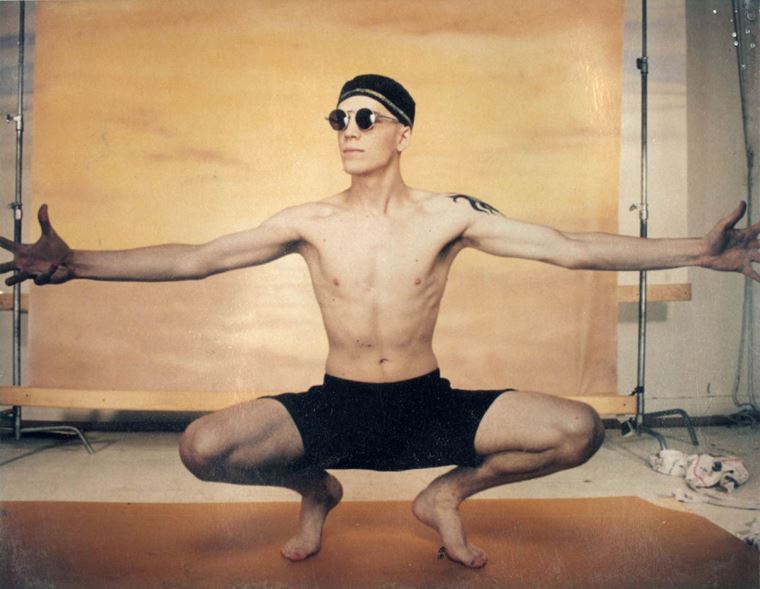The guitarguitar Interview: Joe Satriani
What would you say to Joe Satriani if you had the chance?
He’s the biggest selling instrumental Rock guitarist the world has ever seen.
He is known as being one of the most gifted, technically able and jaw-droppingly talented guitarists on the planet, with a sense for melody and catchy hooks that is unparalleled.
In short, the guy is a master of his art. He’s at the top of the mountain, gazing down benevolently at all other Rock guitarists as they try to scale those steep, hostile inclines.
This has been the case since the mid-80s, and whilst countless other contenders have tried to grab for the crown, Joe remains King. Surfing with the Alien, his second full length album, broke records for the genre and remains the defining blueprint for technical-yet-melodic guitar playing. Joe’s songs are hummable, they Rock hard and they have a propulsion to them that makes them the perfect soundtrack to driving fast in fancy cars.
_a.jpg)
(photo: Richard Bolwell)
Because of Joe, endless scores of us players are better able to talk about scales and modes, just from learning one or two of his songs. His outrageous playing and propensity for wild noises is as famous as his beautiful melodies. Cryin’ and Always With Me, Always With You are going to be played by guitarists a hundred years from now, whilst Satch Boogie will always be the benchmark piece for when you need to just throw down and show off to your uncle or neighbour that you can really play.
Joe has proved that you can have Rock songs without singers, and he has created a vocabulary out of whammy bar techniques and pick scrapes. He taught Steve Vai, which is incomprehensibly cool, and also Kirk Hammett. He’s sold millions of records and tours the world playing to sold out audiences with his signature Ibanez guitars and Marshall amps, blowing minds at every stop.
So yeah, what do you say to a guy like Joe Satriani?
If it’s me, you’ll bug him about distortion, plectrums, setlists, melodies and hand injuries. There’s so much to ask him, especially if you have a long history with Joe, as I do. Like lots of guitarists, I first encountered Joe Satriani not too long after picking up the instrument. Far from being put off by his preposterously good playing, I was instead thoroughly encouraged by the sense of sheer joy that permeates much of his music. I found it to be motivating, exciting, and, like his former student Steve Vai, quite unlike what I found on the radio in the mid 90s. It’s probably true that I still can’t play any of his songs perfectly, but it’s also true that learning them in the first place made me an immeasurably better player.
Joe, like so many professional artists, was due to be touring this year in support of his exciting new album, Shapeshifting. We all know what happened to the entire world next of course, since we’ve been living with it ever since! Instead of waiting a year to try and chat with Joe, I thought it might actually be more interesting and insightful to talk with him now, whilst the world is in this strange limbo. Certainly, there would be a better chance of his availability, and the situation presented questions that otherwise would never occur...
Joe’s a hard guy to get access to, but persistence paid off and I eventually found myself in the rare and enviable position of enjoying a one on one Skype call with the man himself, from his studio in San Francisco. This was back in June, a good few months into lockdown. The idea was to talk about the new record, the whole idea of postponing and rescheduling the tour (you’ll find 2021 UK tour dates at the bottom of the interview) and then, of course, a whole slew of questions about guitar playing! Joe was game, and he was a delight to talk to. He’s a really relaxed, friendly guy with an even temperament, who listens intently and laughs a lot. I thoroughly enjoyed the quality of our conversation, as Joe had plenty of insights to share on a number of guitar-related topics. Hopefully, we’ve avoided some of the more well-worn subjects that Joe gets often asked about, and instead shone some light in other areas. It’s a nice long interview, because Joe was generous with his time and very accommodating.
So, we switch now to the present tense as we sit down at the computer after a long day’s shift. Once we make our connection on Skype and say hello, Joe takes a second to angle his camera and we begin our conversation...
Joe Satriani Interview
Joe Satriani: It’s a bit of a grey day here. You know, it’s the beginning of Summer, and San Francisco is nothing but fog (laughs). Cold and grey!
guitarguitar: Yeah, it’s quite similar to Glasgow, I’m sorry to say! I was in San Francisco a while ago and, like Glasgow, it has the tall hills and cold air rolling in. I was like, ‘Uh...this isn’t really what I thought California was gonna be like!’
JS: Yeah, you have to go to LA if you want that! The Spring is great and of course, once September comes, it’s so beautiful here. It’s really nice.
GG: Yeah, I bet it is! So, this is for guitarguitar, and I was thinking we could talk a little bit about the re-scheduled tour, and what you might be up to in the meantime, but also the new album Shapeshifting, and Ibanez and guitar playing! We’ll fit in as much as we can, if that’s cool with you?
JS: That’s great! I’m ready!
GG: Awesome! So, the tour has been rescheduled for next year due to COVID, and before we get to that, there’ something I’ve always been interested in asking you. Shapeshifting is your...is it 15th, 16th studio record?
JS: (laughs) Yeah, I’ve seen reports! It’s either 17th or 18th.
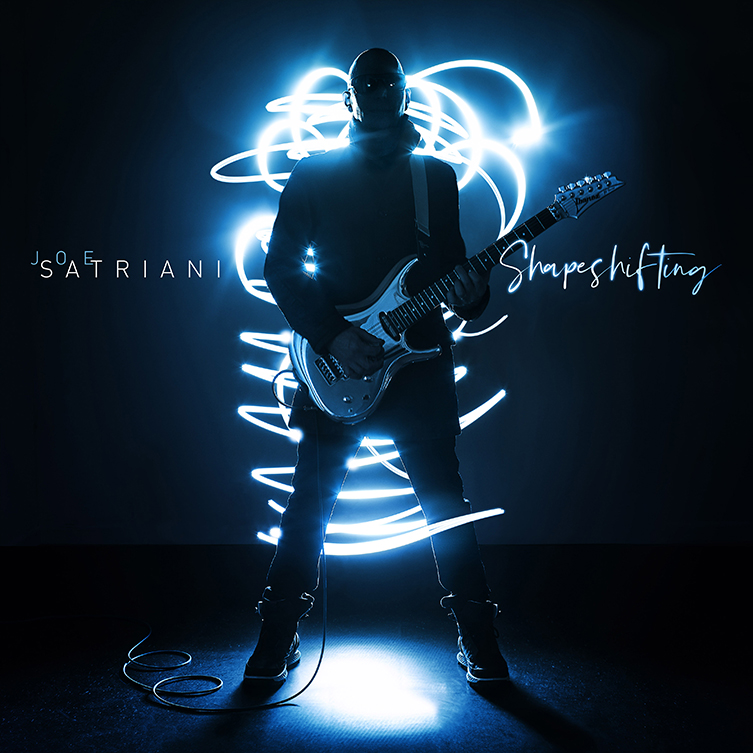
GG: Oh, right, okay! Wow, haha! So, what I’m wondering is: how do you come up with a setlist? You must have nearly 300 songs now!
JS: It’s really hard! Um, but the way you get started – this has worked for a good 15, 20 years now- is, you break it into thirds. You basically think: half the audience at any given show probably has never seen you before: this might be the only time they decide to go take a chance on one of your shows. So, if you don’t play the most memorable songs that your fans have told you are your favourites, you’d be an idiot, you know? I figure a third of the show should be the obvious hits, and then you have to play the new music, otherwise you’ll go crazy! (laughs) It’s just part of the artistic mind. So, you go out there and you bravely say: ‘I know you like the old stuff but here’s some new stuff’. And then, for the other third, it’s actually kinda cool: you go in and say, ‘Okay, what do they not expect us to play? What have we never played before? Or what have we played a lot, but never played like this?’ You know, like, change radically the way a song is portrayed. And that seems to work! It keeps the fans really happy, and it keeps the band happy, and every night when you walk offstage you don’t feel like, y’know, you’re just a robot. You feel like something happened that was really worthwhile.
GG: That’s exciting! So, there’s this percentage of the night where anything could happen! So even for you, it’s not: here comes Satch Boogie, here comes Surfing with the Alien...it’s a bit of a fun danger zone for you!
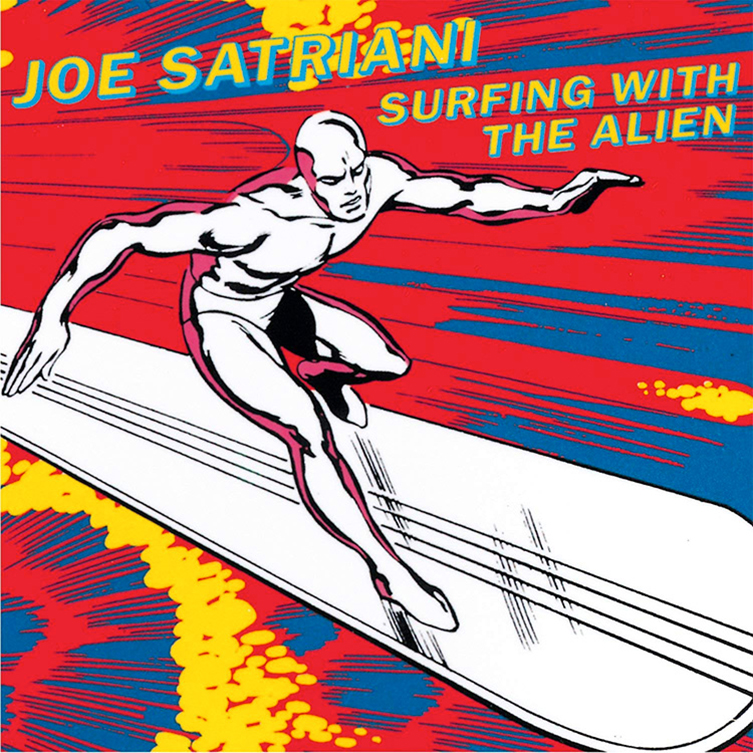
JS: You know, I think...I was just talking to another journalist and he had asked me pointedly about playing catalogue material, and I had to remind him that, you know, it’s such a gift to be able to try to do it better than the album. (laughs) You mentioned Satch Boogie. I remember, first of all, I wrote that song when I was in a neck brace and heavily medicated from a car accident. Why I finally came out of it, I was like, ‘Oh my god, how do you record a song like this anyway?’ So, we go into the studio, we record it and we listen back to it, going ‘Is that the way it’s supposed to go?’, you know? And that was like my first time, like, ten in the morning in Hyde Street in San Francisco, trying to play this song really loud with a professional microphone setup, going to tape, and we’re like, ‘Okay, I guess that’s the way you play it!’. There was nothing to judge it against, right?
GG: Sure.
JS: And so, the record comes out and people like it, and every time I go to play it, it never sounds the same because I never worked on it. I just wrote it, recorded it that morning, and every time I play it again, I’m really working on it again, so if I had a gig tonight, I’d be so happy than I can get another shot at it! (laughs) I’m still thinking (mimes playing guitar), ‘If I could just...I bet I could...’, you know? Drag this note, push that, maybe use this finger instead of that finger, it’ll all turn out better. I’m hopeless that way. Always workin’ on it.
"I wrote Satch Boogie when I was in a neck brace and heavily medicated from a car accident"
GG: I think that’s actually really good to hear, because I’ve tried to play a bunch of your stuff, and some of it seems to be a real stretch for the left hand. But then I’ve noticed on YouTube videos that you’re sometimes playing the next string up, not the same as on the tab, and it’s a bit easier, haha! So, is that what you mean about this constant refining?
JS: Yes, yeah. I mean, sometimes it’s because you realise, ‘Ah! I’m an idiot! I coulda just done it like this’, you know? I saw that a lot. I remember a couple of times at the G4 clinics, where people would play my material and I’d go, ‘Why are they playing it over there?’ And they’d see me playing it and go: ‘Why are you doing it like that?’ (laughs) And I’d be like, ‘I dunno!’ I didn’t really have a good explanation!
There are times though, when you play something and it sounds great, feels great, you know it’s good, and a couple months later it hurts and you go, ‘Oh!’ Like, this is a bad idea! I’ll give you an example. (Joe reaches away and brings across his Chrome Boy Ibanez to demonstrate something, which is quite a thrill, frankly) Okay, here we go. (He plays through the main riff to Shockwave Supernova, which uses those big-stretch sus2/m9 ‘Message in a Bottle’-style chords). Before I wrote that, I guess I didn’t have that technique and when I went to write it of course, I would play it for hours and hours, eliminating all of the versions and finally coming up with the right version. And then, when it’s recorded and all that, and we start rehearsing with the band, everything’s still good, and then we decide we should start the show with this song.
Then, I realised this was a big mistake. (laughs) Because, I had to do this (hand stretch) every night when my hands were cold, and I wasn’t warmed up. You rush out onstage and you’re like, ‘Hey everybody!’, and you really want something easy to play! (laughs) I pick the one thing that really hurt. Anyway, months into the tour my fingers started to hurt. Then they really started to hurt, and I thought, ‘Oh, this is a real problem’. I’d wake up in the morning in some hotel and my fingers wouldn’t move! I’d think like, I’m doing something wrong here...Anyway, it turns out that in the human hand, the muscles are attached to tendons and the tendons to bone. Lumbrical muscles. But for this this little guy here (points to his pinkie finger), he’s the only one that’s lucky enough not to have any tendon. It’s muscle to bone. This creates the weakness. Burt that particular muscle is responsible for all of this (mimes his fingers fanning, as you would do when fretting an instrument). So, cellists, violinists and guitar players, they have this problem if they’re doing this movement over and over again and they’re asking it to do something a little bit stronger, like my song, right? (laughs)
"The audience, I think, they'll cut you some slack if you miss a note, but they won't if you go up there and act like an asshole"
Shockwave Supernova taught me a lesson, that sometimes you have to figure out another way of playing something. It solved itself when I went to surgeons. I went to all these different doctors, and they confirmed, ‘Your hand’s fine, your bones are fine, you got no tumours, you have no arthritis, we don’t know what’s going on. How about stop playing guitar?’ You know, that kind of thing! (laughs) I went all the way back and visited my chiropractor who said, ‘I’ve just got one idea: it’s either gonna work or it’s not’. So, he just sat down and he kneaded my hand for like thirty minutes, and all of a sudden it went away. I never had a problem with it again. Turned out it was just tight.
GG: Wow!
JS: Yeah, it got really tight from doing that at the beginning of every show for like a year and a half. The reason why I’m telling you this is because there are songs where you don’t know they’re gonna be an issue until you get out on tour and you’re sleeping 4 hours a night and you’re playing 6-7 shows a week. That’s when the reality hits! Not when you record it, like Satch Boogie, for an hour and a half early one morning, then you never play it again till maybe 6 months later when the tour starts! So yeah, what you do on a record creates a reckoning and that reckoning doesn’t come until you’re out on tour! Then you go, ‘Oh, I’m an idiot, why’d I write that?’ (laughs) This is what I should write, (picks up guitar and strums simple chords) right? Haha! That would make life so much easier, but instead I do the Mystical Potato Head Groove Thing, you know?
GG: Haha, you don’t seem to be a guitarist who takes the easy route, Joe! That’s interesting, because I was gonna mention the first chord in Always With Me, Always With You because, now I’m going to grab my guitar, and here, I thought it would be so easy to just play like this (I pick up my guitar and play a basic B barre chord arpeggio, adding the little semitone melody with my pinkie).
JS: Nah!
GG: Your way sounds better, right?
JS: It sounds better, you have more control over the sustain – or lack of it – of each note, and you can really play with it. Every time I play it, I realise that that fingering allows me to play each round of the arpeggio differently, and that will actually make it more interesting for the audience, rather than it sounding like a MIDI program, which gives you the opportunity to kind of play with it a bit.
GG: Excellent, I totally get it. So, one thing, when we were talking about your finger injury, and I talk to lots of guitar players, but I never ask people this: do you do any specific warmups before you go on stage?
JS: Well, first of all, let’s preface it: I’m an old person! (laughs) I mean, when I was twenty or fourteen you don’t have to do those kinds of things. This, it looks so funny but this is really great (clasps fingers together and moves hands in a circular motion), this is really great (shakes arms loosely in front of him, laughing as he does it), the kind of things you see retired people doing in the park, right?
"Relax and think about connecting to your audience, which is so much more important"
Um, you know, it’s really interesting...sometimes the activity of stretching is a bad idea. I read once that they found that athletes stretching right before an event decreased the efficiency of their activity. And they weren’t quite sure why and then they realised that it’s really better to stretch a few hours beforehand. Don’t do anything that’s going to leave you tight leading up to the performance, right?
GG: Right.
JS: I remember I read that and thought, ‘Okay, I’m not going to do all the stuff you see people do (pulls fingers back in classic ‘guitar stretch’ style) right before I go on, and it really did work! I found that if I just played guitar without trying to shred myself to death backstage it was actually way better: it was beneficial. And I stopped using amplifiers backstage as well.
GG: Ah!
JS: There were two reasons. Number one, once you get a sound, you just wanna prove to yourself that you’re, y’know, ‘all that’ all the time (laughs). So I thought, okay, we’re gonna cut that out! And then the other thing was, you’d be backstage, you’d get a sound, you’d be dialling it in, and then you’d walk out on stage and there’d be this other sound and you’d go, well, what happened to that sound? So I thought, okay, to hell with it, I’m just gonna practice. And of course my crew loved it, because they never had to put an amp backstage ever again. It’s really quiet backstage now! Drummers love it, and bass players love it because they don’t have to listen to the guitars. Then I realised you don’t play that kinda stuff (shreddy lead stuff); you nice play nice chords, just move your fingers around while you’re talking to your friends and stuff, and that was a better way to warm up: to stay relaxed in the brain, the heart, just relax, you know? Because you practised enough, you know? If you’re someone like me who’s been playing for decades, if you’re not ready now, you’ll never be ready! (laughs) So, you really just maybe relax and think about connecting to the audience, which is so much more important.
The audience, I think, they’ll cut you some slack if you miss a note. But they won’t if you go up there and act like an asshole, or if you don’t pay attention to them. They’ll never forgive you for that. So, that should be your focus, I think.

(Photo: Laurence Harvey)
GG: Yes indeed. What a good perspective! So, the tour will be rolling around again I think next Spring/Summer, about a year after you were originally supposed to be coming around, is that right?
JS: Yeah, we were very fortunate that, working with our promoters and all of our partners overseas, they were willing to do that. To just say, ‘Okay, twelve months’ postponement’. It made more sense to them. We felt like this was a horrifically devastating scenario, people were losing their lives, but we had this feeling like, we bet the doctors and the medical community are gonna figure this out, like they did with other situations that almost became pandemics, and we’ll be able to return.
And so, there’s a thing that the audience may not understand: there’s a huge competition for venues. Ever since file sharing happened, bands have been forced to play far more than ever before. They’re just out there playing, and that means that your local theatre, arena or even club has got a hundred bands asking for, y’know, Thursday night, on any given Thursday night, all around the world! So, your agent, when he says, ‘Hey, Joe’s gonna be in town!’, they say yeah, get in line! (laughs) That’s what they say! Like everybody wants to play Thursday night. It’s really hard to book a tour, it takes like a year of your team sitting there trying to work out how to get from St Petersburg to Barcelona and back and forth. With Wayne Forte, my agent, and all the promoters we’ve worked with for 30 years, everyone said, ‘Yeah, let’s assume that we’re gonna figure this out, that we’re gonna be alive and kicking a year from now and that we’re gonna want to rock and roll’, so we were able to book that. Now I’m just hoping and praying that they come up with a vaccine so that we can all go back to being together rather than separated.
"I was thinking of Nicolas Cage riding his motorcycle on fire, ghost demons chasing him out in the desert, and that was my imagery! Maybe I'm there with him, we're doing it together"
GG: I hope so too! On the subject of the audience being the most important focus, which I think is a great ting for any artist to say, one of the things I’ve always noticed with your music and your melodic sense is a huge optimism. Your music is really positive and uplifting. Is that something that just happens when you play a guitar, or did you deliberately really want to give this type of music to people?
JS: I think it’s both. I think my natural state is to brood on things, definitely. I can be really moody; you can ask my wife about that (laughs) It’s something that I’ve relied on to help me focus on stuff. It’s funny, over here there’s my Pro Tools rig and I’m working on a new album. We’re about twelve or thirteen songs in now.
GG: Wow!
JS: An instrumental album with the live band. And just yesterday, Eric Caudieux (keyboard player) was saying, ‘Oh, what about this song? It’ sone of my favourites that you wrote.’ And I said to him, ‘It’s another slow, brooding song from me!’ And he said, ‘Yeah, but it’s great, we should do it anyway!’ It reminded me that I generally write, like if I’m gonna write 30 songs, there’s gonna be 25 sad, dark, you know (laughs)...and then, how I redeem myself, how I pull myself out ,is to write like a ‘Summer Song’ or something, to convince myself that ‘Ahhh, everything’s okay, Joe, don’t worry about it!’
GG: Hahaha!
JS: Gotta have fun! But I have to say, it is my basic nature. But I do find that those are the hardest to play. It’s so easy to do, like, a Satch Boogie, because everybody jumps on board within the first measure. Your audience knows what to expect. It’s like driving a big Cadillac down a big freeway: wherever you go, it’s ok! (laughs) But when you go to do a ballad, especially when you intimate it to the audience that it’s about a sensitive subject, a sad subject, then suddenly the realm of acceptability of your playing becomes really small and focused. You really have to deliver. I get the feeling like someone says, ‘Am I gonna listen to this slow, sad song? I will...but it’d better be good! I don’t want the artist to take me down this horrible pit of self-loathing’, or whatever it is. Feeling sorry for myself. Unless there’s a pay-off.
GG: Sure.
JS: So, I do find that they are really hard and that’s why sometimes they stick around for two or three records, until everyone figures out what to do with them. Or, sometimes it takes me a long time to figure out how to play it. Sometimes you get lucky because you weren’t paying attention. There’s a song called Cryin’, from The Extremist album and my performance was one take by accident. I don’t think I could’ve played that had the light been shining on me, had the engineer been looking at me like (puts head in hands looking bored) ‘come on, Joe’, if it was like take 125 (laughs) I was just there in the control room, no one was paying attention to me, no one was looking through the glass at Greg and Matt Bissonette (session powerhouses – Ray) and they just thought I was playing along to guide them. When we finished it, Andy (Johns, producer) turned around and said, ‘Oh my god, you just played the one! You just did it! What were you plugged into!’ And he was horrified that he hadn’t recorded it properly, because I had plugged into a Zoom, of all things, right? A little thing from the early 90s. But that wound up on the record! So, I think getting caught off guard was good in that respect: I guess I was just myself, unfettered. I wasn’t worrying about myself, so I played the right performance.
GG: I never really considered the extra responsibility on you as the performer, when you’re not just going on a ‘mad rammy’, as we’d call it in Glasgow! The ballad style kind of zeroes in on you kind of ‘singing’ to the audience. I never considered that!
"When you go to do something beautiful that requires really great phrasing, you suddenly realise how hard it is!"
JS: I’ll tell you something really funny: a friend of mine, Santiago Alvarez – who designed the whole JVM line for Marshall and did my amps – he said to me the other day, he was playing along with my new album because he’s a guitarist and he said: ‘It all sounds so easy until you go and play it. Every time I go to play one of your melodies, I sound like a MIDI guitar! (laughs) So we started having this same conversation, about how when you go to do something beautiful that requires really great phrasing, you suddenly realise how hard it is! Every note, you’re going, ‘How long should it be? How short should it be? Which pickup should I use? Should I pinch the pick? Should I put, y’know, a lot of mass on it?’ Every note is a world of possibilities and it speaks volumes to the listener when it’s all put together.
GG: Very much so. That’s the difference for me when I’m jamming away on, say, House Full of Bullets (from Crystal Planet): that’s one of those riffs that ‘shows up’ for my every week when I’m playing, and that’s one thing, but then I try to play Friends from The Extremist, which is such a beautiful song, but yeah, I sound like a MIDI guitar when I play that! (laughs) Maybe what I ned to do is relax! Remove responsibility.
JS: Yeah, there you go!
GG: Sorry, I’m going of off on one! One of the things I found really interesting was, I was watching some of your videos for the making of Shapeshifting. There’s a track, ‘Spirits, Ghosts and Outlaws’, one of the many highlights of the album. You mentioned about how you feel kind of like an outlaw in the music industry! You and Steve Vai are pretty much the most famous instrumental Rock guitarists who’ve ever really lived, so how is it you feel like an outlaw! Haha! What’s all that about?
JS: (laughs) Well, because of the reality. When I go to release a record, we sit down with the guys from Sony Legacy, who are amazing! I mean, I can’t believe they keep giving me money to make records! We talk about the reality of: how do you get this song in front of people’s faces, you know? How do you get ‘em to hear it? There are so few Rock stations. Believe it or not, there are funny things going on out there. We hear from Rock stations who’ve always been super supportive of me, that they are only gonna play one instrumental, pretty much every two years. There’s only going to be one to make it to the playlist. And they’ll say that like, even when we were finished with one song, we go, like, ‘Nineteen Eighty (track from Shapeshifting), that was great, but how about this song?’ and they go. ‘Well, sorry! We already got Nineteen Eighty’, you know? (laughs) We’re like, ‘Yeah, but there’s other songs!’ And they just say no, we don’t play those.
Three minutes and twenty seconds for an instrumental, that’s about it. And you start to realise, oh my god, it’s a Pop/Hip-Hop world. It’s got nothing to do with what I do every single day of my life, which is play electric guitar. It’s such a microcosm within a microcosm. And so, when you decide to do a song like Spirits, Ghosts and Outlaws, you realise it’s no reflection to what’s happening out there, in terms of artists who get billions of streams, Billie Eilish or someone like that. How does Spirits relate to that, you know? It doesn’t!
GG: Sure, sure.
(Photo: Joseph Cultice)
JS: So, then you realise, I’m doing this because I love it! To think that I’m doing this because there’s going to be gain from it is like, forget it! It’s not 1985 any more, so...I was kinda riffing on that idea that, when I used to go down to the Sony building on Madison Avenue, this big great Sony building, and you go up through all the different levels, you can’t help but feel the enormous weight of what’s truly successful in the world out there. And then you’re there like, ‘Hi! Remember me?’ (laughs) ‘I’m also on your label!’ And the people there are really great, don’t get me wrong. They’ve been my biggest supporters ever. They come out when I’m making records and they sit around and they enjoy it, which is great. They’re guitar lovers. But, we have to have those frank conversations about what are the expectations here. We have to adjust our budgets because they are a business too, and they’re not going to put a million dollars behind something that they think is gonna return twenty thousand! When we have these discussions about this, we can laugh about it. They know that today, a musician has got to go out on tour. There’s only maybe a handful of artists that truly make money selling albums, you know, like they could just stay home?
GG: Yeah.
JS: Pipe and slippers, and just hang out and wait for the royalty cheques to come in! I don’t know, there’s like five or ten artists who can do that, but even the biggest artists are out there touring. They have to go out, have to sell their vodka, their perfume, their merchandise to make it all work. It’s one of those things that you can joke about and I think I was joking when I said I felt like an outlaw in a way, but I have to say, I was also, y’know, I was thinking about Nicolas Cage – who I think is one of the greatest actors of all time, I know that’s crazy but I know it in my heart (laughs) – I was thinking of him, y’know, riding his motorcycle on fire, ghost demons chasing him out in the desert (laughs) and that was kind of like my imagery! Maybe I’m there with him, we’re doing it together. Who knows what we were getting into trouble for...but that gave me the artistic licence to use the Telecaster. Actually, it’s this guitar (picks up his Ibanez JS Chrome Boy again) and the Tele, that very cleverly are trading.
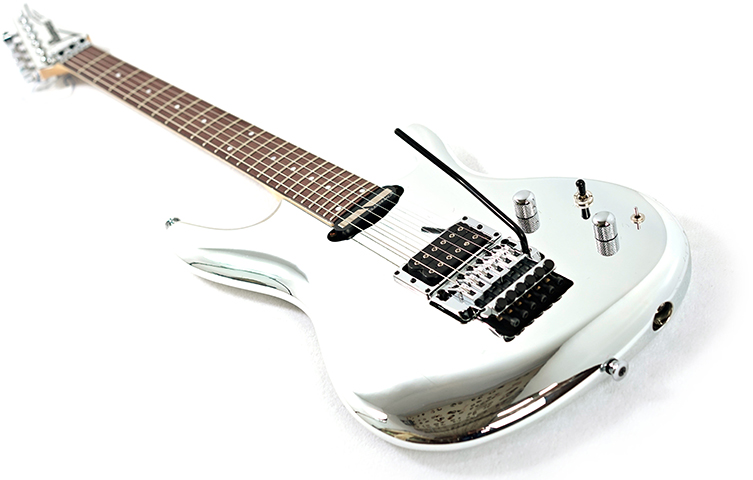
GG: Oh cool!
JS: Yeah. The Telecaster doesn’t really play in tune very well, and the guitar part on that song kinda ventures up beyond the ninth fret, so for those moments, I actually played this guitar in its place and we sort of blended them so it’s hard to tell where the Tele hands off to the JS.
GG: That’s so cool.
JS: I had fun with that. Sometimes you pick up a different guitar, you play differently.
GG: Mmm, very much so! I also think you should get Nicolas Cage and a motorcycle in for a video! That’s what you’re needing, man, that’s gonna solve everything!
JS: (laughs) I know! And I think, ‘What could it possibly cost?’ It’ll be worth it, right?
GG: Haha, I think Nicolas Cage will be up for it. Couple of phone calls, easily sorted. Haha! Yeah, so, the new record, Shapeshifting. Something I’ve noticed increasingly with your guitar sound over the years, is that you seem to me to be a man who loves distortion! Like, there’s so many more textures and gnarly kinds of ‘moments’ happening. Is this what it is: a pure love of distortion?
JS: Yes, it is. Yeah! Ever since I was a little kid and bought an Electro-Harmonix Big Muff Pi through the mail, I just fell in love with it. Very hard box to use live, especially when you’re a little kid playing through a crummy amp but...I just think the complexity of those early distortion boxes, the germanium circuit ones, are so pleasing to the ear because every second, they just throw out something different. The harmonic content is very rich and plentiful and so we try to manage that as much as possible. Having said that. When I think about this record, we used a lot of small Fender amps. We had my JVM and my Peavey, which probably were used the most, Peavey 5150, but we also had older Dual Showmans, and a set of Blackface heads that were mine and Jim’s (Jim Scott, producer), and I brought a bunch of new Fenders that were either handwired ones or the new custom Silverface ones.
"Every note is a world of possibilities, and it speaks volumes to the listener when it's all put together"
GG: Cool.
JS: They were great, especially those songs where you have three or four guitars that are handing off sections to each other and you’d like a new sound. They’re a little bit smaller sounding, but they allow the bass and the drums to stay big, they don’t cover everything up. My music is definitely Classic Rock-based, so that means I shy away from making the bass guitar, the guitar and the kick drum do everything together. That’s just a different genre of music, you know? I love the early Rock and Funk, where everybody had a different part. That allowed everyone to be in the mix together, which means that you have to arrange sounds differently. You can have the biggest sound in the world because it’ll cover up the drums and the bass. I mean, Jimmy Page knew this well, which is why some of his best guitar stuff was really small. But it kept John Paul Jones and John Bonham always sounding massive, but very comfortable.
GG: Yeah!
JS: They could be loose and groovy, with skinny guitars going on hard left and right, but no one invaded the other’s space, you know what I mean?
GG: Definitely!
JS: I thought that was really great, I think about that a lot. I haven’t really done a lot of songs where I felt comfortable where the guitar would mask the bass guitar and I would force the drummer into doing the exact same riff that I was doing! (laughs) It’s great for a part, but for a whole song it’s like, ‘Ahhh, I dunno’.

(Photo: Joseph Cultice)
GG: Yeah, I know what you mean. Having said that, with the tones on the new record, you have moments - aside from the melodic lead guitar side of things - where these kind of ‘Satriani Sonic Explosions’ occur! These can be whammy bar shrieks, it can be pick-scrapes, it can be the hand going over the strings...there a lot of incidental noise that’s the ‘goodness’ of a distorted guitar that I think you’ve made into a real thing. Sonic moments that are part of the listening experience. That’s something that other instruments can’t do; wouldn’t you say? The guitar’s perfect for that kind of expression!
JS: Yeah, well I’m glad you point that out! The guitar is a percussive instrument, it’s a rhythm instrument, it’s harmonic, it’s melodic and it’s electric: that’s a lot going on right there, you you? Other instruments are missing some of those. The other thing that allows that to happen is the way you record.
A perfect example would be ‘All for Love’, that requires super attention to detail when approaching the guitar and the strings. There’s a lot of gain, and that’s a live performance, I think maybe take nine or ten. I was trying very carefully to control the intonation of the guitar, knowing that sixty-four bars ahead, I was going to have to do something that might put the guitar out of tune things like that. I had to deal with the fact that I was just about 8 ft away from (drummer) Kenny (laughs), and the fact that some of my noises would probably get into Chris’s (Chaney) bass pickups, because we were all there in the room playing together.
"If you take a Les Paul and put a Floyd Rose on it, say goodbye to everything 'Les Paul' about it!"
I also had to deal with the fact that the guitar, with that much gain on it as you said, has got all this surface noise, all of these things that wind up being part of the performance. I had to accept it, control it and use it! So, if you listen really carefully to that performance, you say, ‘Hey, what’s that noise?’ You know? (laughs) And yeah, there would’ve been other records where we’d say, ‘Oh yeah, we’ll get rid of that, don’t worry. We have Pro Tools; we’ll get rid of that noise’ but we decided we should leave it all in there because the sound of the struggle, I think, adds to the emotional message of the song. We want you to realise that there’s somebody playing this guitar on those strings, and those notes are damn high! You can’t play them and just get away clean! There’s gonna be an artefact. And so, we left it all up there. We did that on quite a few songs. We went: ‘That’s a dirty guitar part and that’s what it sounds like when someone’s fingers are on the guitar doing that. I like that, that made it fun.
GG: Yeah, it’s not only fun: it’s expressive. And not only that, it’s something that you can’t just go onto Ableton for, and drag & drop it into your song. It has to be, as you say, a human being interacting with this electricity and metal. That’s an ace because it’s unavailable for anyone who can’t do what you can do. I love hearing that as well. Now, one thing I love talking to guitar players about is plectrums, because I think they’re very underrated in terms of what they can do for you as a player. I noticed you have a range of plectrums, different gauges and from D’Addario. Obviously, that’s for people to choose from and buy, but I wondered, what do you actually prefer using yourself?
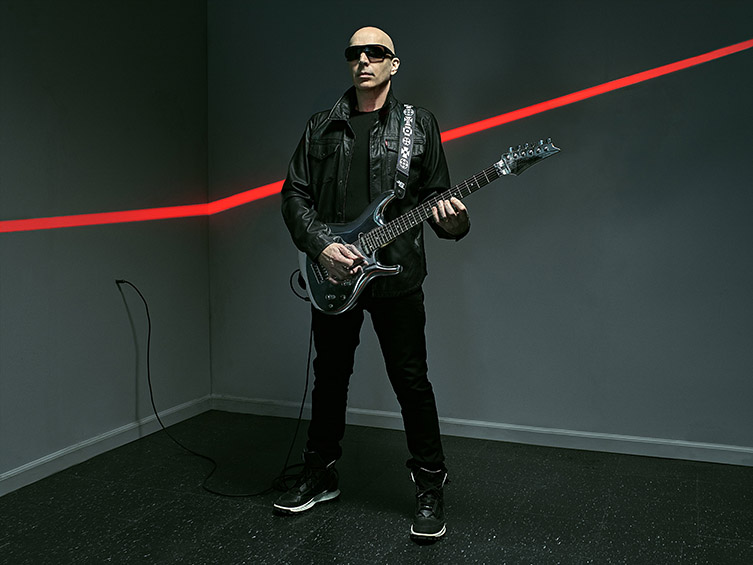
(Photo: Joseph Cultice)
JS: Most of the time I use an Extra Heavy pick. What is an Extra Heavy? It’s 1.5mm, I think. I think, technically, that’s what they call it. I like the cellulose picks. I’ve tried every kind of pick (Joe starts looking around his desk for a particular pick). I have this packet with Thin, Medium and Heavy picks. Thin picks picks are great for strumming acoustic guitars, for that Rolling Stones track or whatever, when you don’t really need to hear every string of the acoustic guitar, but you need to hear that there’s a guy playing it over on the right channel. That’s so important. Mediums, I find I really like for Blues playing, because they’re not that assertive and they bring out a little more of the high end of the string. You wouldn’t think they would be that perceptible. (Joe is still rummaging through his pick drawer and pulling out bags of picks) I have felt picks for bass, obviously I play a lot of bass at home. I’ve got these metal picks, the Chrome Dome picks. The Chrome Dome pick is just insane! But it can be clicky, so if you’ve got an amp sound that’s already got a lot of 2k, 2-3k (in terms of EQ frequency – Ray), be careful with that. (More searching for picks) I’ve got a bunch of Agate picks in various thicknesses which are really interesting. Once in a while, I’ll pick up a Rick Neilson pick, or an Eric Clapton pick. I actually have Jeff Beck picks, which he obviously doesn’t use, but he makes them, and it says ‘steal this pick’ on it (laughs).
In general, if I get serious about it, the thinner the pick, the less mass, and that seems to make a big difference. The best sound that I have ever heard from a pick has been from a real tortoise shell, used on an acoustic guitar. It blew my mind, when I sat down with a guitar builder one day and we just decided to prove it to ourselves, what sounded best. You can really hear it on an acoustic guitar because there’s no processing. I would play, and he would play, and hands down...it’s against the law obviously, to harvest them and sell them because they’re part of an animal, but if you’ve got one laying around from 30 years ago, you should treasure that. There’s something about the tortoise shell that is remarkable. It somehow brings out all the frequencies of the string and it doesn’t add any glassy top end, and it isn’t dull.
The closest thing I’ve found has been the Extra Heavy, 1.5mm and it seems to make the melody playing more assertive, from low end all the way to high end. But I do a lot of playing where you barely see the pick (holds up his right hand, his fingers are very close to tip of pick), sometimes I’m letting the whole pick stick out, and I’m constantly angling the pick. I might have twenty different positions for a four-bar phrase.
GG: Wow, that’s something: it’s not even just the pick, it’s how one utilises the pick.
JS: Yeah.
GG: That’s something that most people won’t pay enough attention to. That’s amazing. So, Ibanez! It’s 30 years with Ibanez and your JS models.
JS: Yeah.
GG: I noticed that nowadays they have 24 frets over 22, so I guess this is a two part question, really: what was it about Ibanez that you really liked in the first place, and is the 24 fret thing more about the feel of that slightly longer neck, or is it that you’d prefer to have those extra noted for composition?
.jpg)
(Photo: Joseph Cultice)
JS: You know, actually, it was something else! I was doing a tour in Russia a number of years ago, and I was just hanging out with the Ibanez rep there, just going out to dinner and having fun. We started talking about guitars in general, and about trends, you know: are guitar players liking humbuckers or single coils more, and with the new styles of music, the tools change, you know? So, we started talking about Fender versus Gibson, 21 versus 22 frets, and I always liked a 22-fret model with a humbucker because you can place it in the right spot. We started talking about that and we said, it’s too bad they don’t make a single coil that fits in the right spot for a 24-fret guitar. That was the only reason I didn’t like a 24-fret guitar, because they move the humbucker back and it sounded like crap, you know? It stuck in my head and I thought, ‘why can’t we just solve that problem? It’s gotta be solvable’.
So, I went back to Gary Brauer, my luthier here in San Francisco, and said: ‘Can you and I create a prototype to send to Ibanez that proves we can stick a neck pickup in the right place with a 24-fret guitar?’ So, my question to him was like (points to the very end of his Chrome Boy’s neck) ‘How little fretboard do we need to support this fretboard here?’ Because a lot of people would say that you need like, a big lip of Rosewood here. And we realised that, actually, you don’t at all. There’s nothing weak about having just a little bit of Rosewood there. We measured what we felt was the best place for a humbucker-type but with a single coil profile to be, and then we made a neck and stuck it in there. We sent them the prototype and said, ‘Could you guys do this?’ They were totally into it, but it took them a little while to re-tool the factory to make these things, but that’s what finally got me to say, ‘Yeah! This is great!’ Now, I have to say: it’s great – I know there are people in the audience going ‘Aaaargh, that’s really high!’ (laughs) But sometimes you wanna play those notes! Of course, now I’m playing melodies that go up to high G so it’s like, oh my god! It’s funny: back here, I dunno if you can see (Joe moves aside to show me a drool-worthy rack of amazing Ibanez guitars alongside a few others along his studio back wall), there’s a bunch of prototypes. We got grey, blue and yellow here and the new white. I think that’s gonna come out soon, as well as the Paisley guitar.
GG: Niiiiice!
JS: These are all 24 frets but we’re thinking about bringing back a 22-fret model, just for fun. We haven’t done that for a while. And we’ve been working on a three single coil version as well. It’s kind of like, just about everybody does that eventually. I don’t wanna step on anybody’s kind of ‘manufacture toes’, with crowding the market with stuff!
"The sound of the struggle, I think, adds to the emotional message of the song"
But I think that the JS guitar is a unique instrument in what it was eventually designed for. It was designed around me and the melody playing and everything. I notice the difference right away when, let’s say we’re making a record and we’re looking for the usual sound, if I pick up a 335 I go ‘Wow, what a difference that is!’, you know? Or a Telecaster. You can bend them: you can make a 335 less warm; you can take a big fat Les Paul and you can skinny it down if you want, but sometimes it’s just the feeling of the instrument and what it provokes and brings out of you in terms of performance. Sometimes that’s more important than just trying to say Les Pauls are big and fat, Teles are skinny, Strats are skinnier, you know? That kind of thing. All it takes is a talented artist to change your mind about that.
GG: Sure, absolutely.
JS: I think, with the Stratocaster, there have been so many amazing artists that sound so different from each other playing that same instrument. It’s just a versatile guitar. But the JS with this system on it (points to the Floyd Rose Edge tremolo on his Chrome Boy) really changes things. I find that’s the biggest thing going. If you take a Les Paul and you put a Floyd Rose on it, say goodbye to everything ‘Les Paul’ about it (laughs).
GG: Hahaha! Yeah, pretty much!
JS: It’s almost like when you put a Bigsby on a Tele, it’s no longer Leo’s 1950 Telecaster. It’s something else entirely. There’s nothing wrong with it! There’s nothing bad about it, it’s just... something else, haha!
GG: Yeah, I quite agree. It’s intrinsically different. The inherent qualities you look for are altered. Now, Joe, you have been very generous with your time already, so I only have one more question for you. I was reading your autobiography recently, Strange Beautiful Music, and for one thing, it’s lovely for a musician to read about all the details about the guitars, the studio gear and so on. One thing that you said was what’s important for a player, beyond technique, is to bring out one’s unique personality as a human being, and then as a musician and an artist. So, I figured, one slightly cheesy but nice question to have as my final question is: as Joe Satriani, master guitar player – you have to accept that, it’s a fact – (Joe laughs) what advice might you have for any player, who is maybe already quite a good player, but wants to step outside of the normal generic boxes they might play in, and find a more unique, more melodic voice?
JS: Well, uh, the guitarist that’s out there making albums has a distinct advantage that there are these documents – the albums – that stick around forever, and so you can keep looking at them and analysing them. They gain in importance as time goes on because you realise that they can never happen like that again. Like, you listen to early Jimmy Page: he must hear himself and go: ‘Oh my god, I was such a young man, so crazy, so wow!’ You know? ‘Why did I leave that mistake on there?’ We love it! We love everything about him, because it’s Jimmy Page, but of course he’s a professional musician, he would want to go in there and fix it! So, I know what it’s like to be a musician who’s not making albums, and the reality just (makes whoosh noise) goes by! You have no time! How do you reflect on your style if it’s never recorded and reviewed by people? Dissected. There are no books: 99% of musicians out there don’t have books about them, you know?
GG: Sure.
JS: I bring this up because when I started playing electric guitar, my first amplifier was actually a tape recorder! A Wollensak tape recorder, a big sort of metal tank where you put on ¼ inch tape and push big solenoid switches. The only way to get sound to come out of the speakers was to record myself, so after I would practice for a bit, I would listen back to see what it sounded like. It was awful, of course, but I got used to the idea of listening to myself and going, ‘Oh, that’s interesting! Don’t do that again!’, that kind of thing.
So, my first piece of advice would be: it’s so easy to record yourself now. If you’ve got a phone, laptop, computer, whatever, just always record yourself. And sit back and develop an opinion about every scale, every chord, every juxtaposition of the two, rhythms, picking techniques. When you practice, stand in front of a mirror, not to check how cool you are (laughs) but to look at your hands, and to think about it, you know? It’s so important, and it’s something I realise every time I go out on a G3, how much time every guitar player puts into practising. Every guitar player that we’ve had out on a G3 tour has been a model citizen in terms of being a fantastically dedicated musician. To watch them practice, it’s just awe-inspiring. Then you see them go onstage, and they turn on the ‘entertainer’, but they keep that other part of them. You know it because you’ve heard them all afternoon long backstage, practising to a metronome!
.jpg)
(Photo: Joseph Cultice)
So, the hard work is extremely important, but you do have to let yourself go. You have to figure out a way to catch yourself off-guard. And I think that means improvising. Sometimes, like yesterday, I actually put on a record I really love called From the Cradle. It’s an Eric Clapton record from a long time ago. That is a fantastic Blues record. It has Andy Fairweather Low on it, and he just makes everything good. If he’s in the room and people are playing music, everybody plays better because Andy’s there. I love playing along with that record. It’s not my style!
"Satch Boogie is like driving a big Cadillac down a freeway"
You probably see there’s an SG back there (referring to his rack of guitars behind him), I still can’t play SG’s, but I always figure to have one around just to see. Just to piss me off or something, I dunno (laughs). I’ll put on a record like that and play along with the SG and when I’m done, I’m like ‘God, these guitars!’ It catches me off guard because I can’t do all that stuff I do on my albums! I have to bring some other part of my musicianship out, and just that process is fun. It’s good for the soul, it’s like the ultimate cross-training, you know what I mean? If we had to reduce it to a sport, I’d say yeah, if you practice Shockwave Supernova over and over again, you’re gonna get a pain like I did, so the thing to do is to do something else. You’re still playing music: you have to polish your musical sensibilities, you have to stay in tune, play in tune, be in time, the only difference is that the style’s totally different. It’s all loose Blues, so you’re playing different phrases, so you can’t do all this stuff (mimes shredding) all over it while Eric is playing some beautiful Blues stuff. So yeah, I’ll do that, and I really like to do that. I’ll spend an hour playing acoustic, fingerpicking, which I’m not very good at but I’ll do it, it’s good, and then I’ll sit down and get back to something I’m supposed to be doing, like for an album or another musician. It seems to really help me out, bouncing around like that.
Trust Joe to come through with some off-the-cuff great advice! We don’t really believe him about his fingerpicking skills or his ability to play an SG, (super-talented people are often the most humble) but we suppose these things are all relative! Plus, it’s nice to hear that one of the best guitarists in the world has the odd technique problem to overcome!
As usual, I could’ve gone on and on, but Joe had already given me much longer than I’d negotiated with his PR, so I felt that staying on would be inappropriate on my part. With a quick thank you, goodbye and click of a button, I was back to my kitchen in Glasgow and Joe to his studio in San Francisco.
I’m not sure what you would’ve asked Joe in my place, but did you expect us to cover subjects like Nicolas Cage? I didn’t, and I was part of the conversation! I’m glad we did, because these little details are what often don’t happen in more formal conversations. Plus, there was a ton of great stuff concerning the business side of being a world-famous guitar player in this day and age that I’m not sure he gets to share too often. I came away from the conversation highly illuminated and very happy to report that whilst, yes, after all, Joe Satriani is just a human being, he’s a very friendly, down-to-earth and exceptional one.
Joe’s Shapeshifting tour has been rescheduled to May 2021, and tickets are available now. Here are the rescheduled dates:
Joe Satriani – The Shapeshifting Tour – May 2021
Tickets – www.alttickets.com/joe-satriani-tickets and www.joesatriani.com/road
Birmingham, Symphony Hall - Friday 30th April 2021
Bexhill-on-Sea, De La Warr Pavilion - Saturday 1st May 2021
Manchester, Bridgewater Hall - Sunday 2nd May 2021
London, Palladium - Tuesday 4th May 2021
Gateshead, Sage - Wednesday 5th May 2021
Glasgow, O2 Academy - Thursday 6th May 2021
Joe Satriani is one of the world’s greatest guitarists. If you haven’t seen him perform before, you need to do yourself a favour and book tickets for whichever show is closest to you! If you have seen Joe before, you’ll be super-glad about the rescheduled dates! You can keep up with Joe's latest news via the official Joe Satriani site, too.
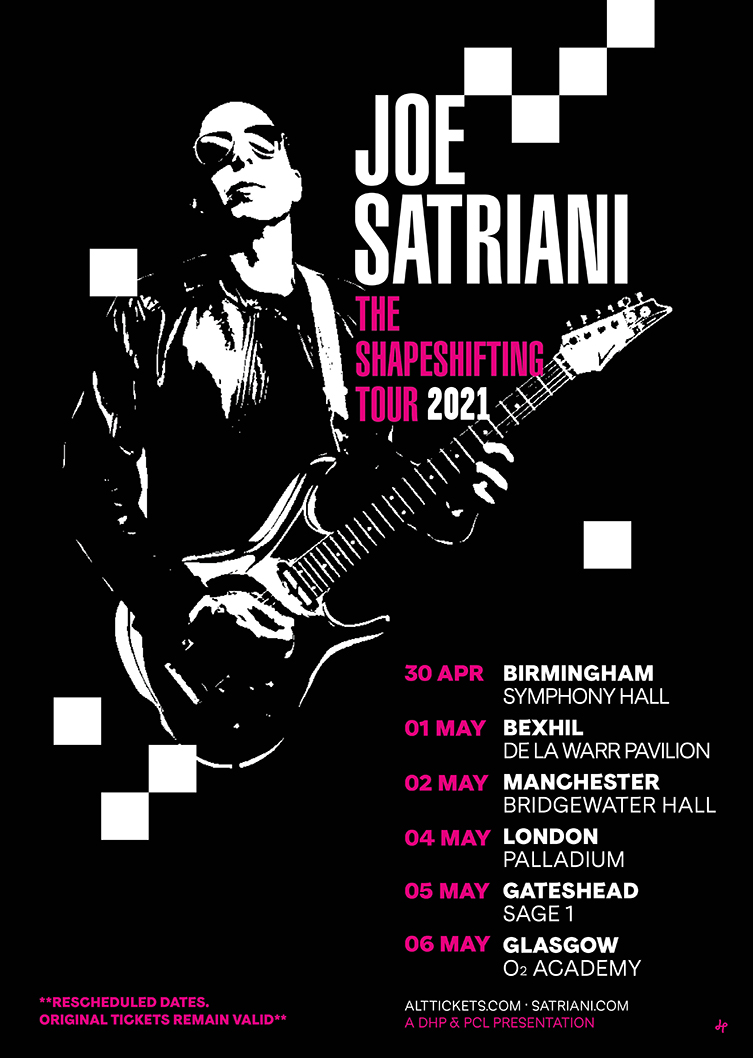
We’d like to thank Joe massively for his time and his excellent, thoughtful and super-interesting conversation. We’d also like to thank Peter Noble for his help in setting this up for us. Thanks also to you for clicking through here and reading this! We sincerely appreciate it. Stay tuned for more interviews in the future, and have a look on the site for more interviews with Steve Vai, Guthrie Govan and many other outstanding players.



